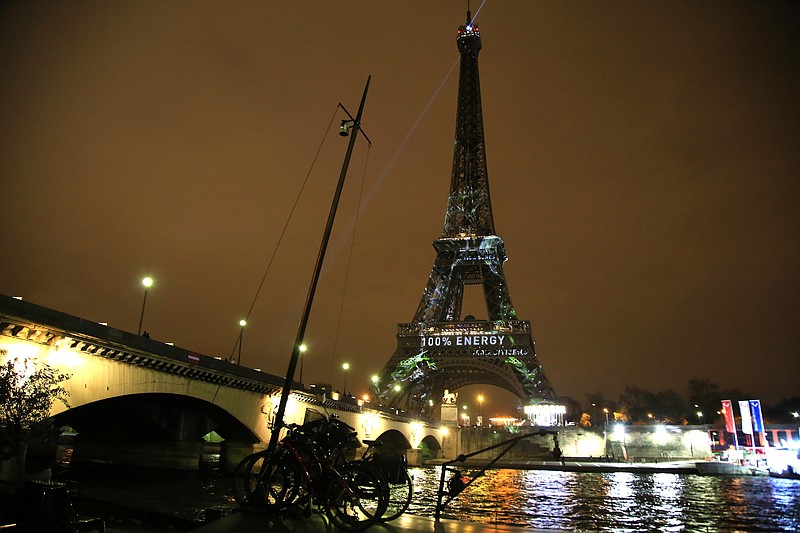We've seen it begin.
As greenhouse gas pollution has steadily risen, so have atmospheric temperatures around our Earth. But the effects of global warming we mostly see are persistent droughts, extreme weather, dripping glaciers, melting ice caps, dying corals and a slow but steady sea level rise.
By this past October, the Earth - including the surface of the ocean - had warmed by about 1.7 degrees Fahrenheit since 1880 when tracking began. The warming is greater over land, and greater still in the Arctic and parts of Antarctica.
The change could tip to full-scale catastrophe late this century. Scientists generally agree that the warming must not exceed 3.6 degrees Fahrenheit from preindustrial levels. If current pledges from about 170 nations come true, studies indicate the world still will warm by 6.3 degrees by 2099, making the future pretty miserable - but less so than business-as-usual models showing temperature increases of 8.1 degrees or more.
Slowing the burn can offer more time for civilization to adjust - unless there are abrupt changes, like a collapse of agriculture. Some experts already think we're seeing microcosms of climate-induced chaos where it has acted as a contributor to some of the political unrest in the Middle East and Africa.
Against this backdrop, the United Nations Conference on Climate Change began Monday in Paris, offering new hope after a score of previous, similar talks.
This time, however, there is a glimmer of public urgency. In the U.S., a solid majority of Americans say our nation should join an international treaty to limit the impact of global warming.
What is certain is that this is likely "our last hope," said Fatih Birol, the new director of the International Energy Agency.
In some of the first talks, in 1992 and 1997, progress stalled in battles of the haves vs. the have nots - the developed countries and those trying to come of age. Countries trying to grow up have had voracious energy needs and little money with which to make energy, so they chose the cheapest - and dirtiest - fuels.
This time, the world's leaders and scientists have learned from past mistakes. Instead of pursuing a top-down agreement with mandated targets, they have asked every country to submit a national plan that lays out how and by how much they plan to reduce emissions in the years ahead. So far, more than 170 countries, accounting for over 90 percent of global greenhouse emissions, have submitted pledges, according to the New York Times. More may emerge in Paris.
But perhaps most important may be the influence of money and multibillionaires like Bill Gates. Gates and a team with 19 governments and 28 billionaires from 10 countries are creating a multibillion-dollar public-private coalition to fund clean- and renewable-energy research.
Read their lips: Where there is uncertainty, there is opportunity. And where there are unchecked rising temperatures, there is collapse.
A switch from finite fossil energy to cleaner, renewable energy sources is not only necessary, it's inevitable. It's also an opportunity for creating jobs - just not the same jobs now fueled by the business as usual fossil-fuel industry.
What we must determine is how and when to make the switch. Mankind is an immensely powerful force of nature. We caused this impending crisis, but because we can accomplish great things as well as horrible things, we can make positive impacts if we look at this issue scientifically rather than ideologically. And if we do what is morally right.
Seventy-five percent of Americans polled in November said that global warming was already having a serious environmental impact or would in the future. Nine in 10 Democrats agreed, compared with 58 percent of Republicans. Only one-third of Republicans said they believe it would never have much of an impact on the environment.
What's more, a majority - including a bare majority of Republicans - said they would support domestic policy limiting carbon emissions from power plants.
The downside of that slight Republican majority is that many in our GOP-controlled Congress don't seem to be in it. Our GOP leaders seem instead to think like - or at least be controlled by - the one third who doubt there actually is a problem. The stark partisan divide in Congress on climate policy will still make it difficult for President Obama and his successors to put in place the energy and climate policies needed to support a robust international agreement, the goal of the Paris talks.
What can we do? The scientists will do the science, but we can talk loud and long to our representatives and senators. We must make it clear that our vote is worth more than fossil-fuel support.
